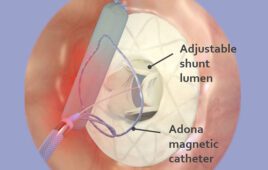 A Rensselaer Polytechnic Institute engineering team has won a grant from the National Institute of Biomedical Imaging and Bioengineering of the National Institutes of Health for the development of its virtual bariatric endoscopic (ViBE) simulator for virtual reality-based training.
A Rensselaer Polytechnic Institute engineering team has won a grant from the National Institute of Biomedical Imaging and Bioengineering of the National Institutes of Health for the development of its virtual bariatric endoscopic (ViBE) simulator for virtual reality-based training.
Led by head of RPI’s department of mechanical, aerospace and nuclear engineering Suvranu De, and in partnership with the Indiana University School of Medicine, the research team recently completed studies to gather data from endoscopic sleeve gastroplasty (ESG) procedures to recreate optic and haptic senses in an accurate and realistic virtual environment, according to a news release.
The training tool is designed to not only offer a realistic virtual procedure, but it is set to provide real-time feedback and a performance scoring method. RPI said engineers will validate the ViBE simulator by analyzing how the skills learned in a virtual setting can be transferred to the tangible world in order to enhance patient safety.
“We are in this unprecedented convergence of technology,” De said in the news release. “We are looking at high precision sensors, and tools. We are looking at these devices that did not exist before. … I’ve chosen surgery and endoscopy as fields of interest because of the huge unmet need. Human safety is absolutely paramount.”




